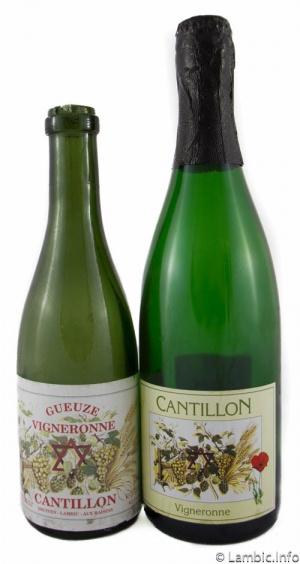Cantillon Vigneronne

Description
Cantillon Vigneronne is a grape lambic produced yearly from Italian white grapes, most often of the Muscat varietal, though it depends on the harvest. Vigneronne is bottled in 75cl bottles and is generally bottled sometime between mid-October and late-November. Though the brewery states that it is only available in 75cl bottles, Vigneronne was also available in 37.5cl bottles on at least two occasions in 1999 and 2005. The fruiting process for Vigneronne consists of taking fresh grapes and placing them whole (without stems) into stainless steel tanks with two to three year old lambic for a maceration period of 1-2 months. It is then transferred to a stainless steel bottling tank until it is ready to be bottled.
History / Other Notes
On Cantillon's official website the brewery states that "the name Vigneronne Cantillon was given in 1987" with a bottling presumably produced in 1989, though its history dates back much further than that. Jean-Pierre Van Roy first experimented with a white grape lambic in 1973,[1] as well as a bottled version known as Cuvée Neuf Nations in 1987 with lambic brewed in 1985. The label design for both the imported U.S version and the European version of Vigneronne remaining relatively unchanged since its creation by artist Raymond Goffin in 1989.
This beer was previously named Gueuze Vigneronne; however, the word Gueuze was eventually dropped as it is not a blend of 1, 2, and 3 year lambic.[2]
Unsubstantiated Stories
Cantillon Vigenronne is alternatively known as Vigneronne Birra All'Uva (Vigneronne Grape Beer) in Italy.[3]
Brewer's Star
The six point brewer's star displayed on the label, which is identical to the Jewish Star of David, actually has its roots in alchemy. It represents the balance between fire, air, water, and earth. The Museum and Beer and Brewing explains the balance as such:
- These elements include Fire, the masculine element of action and determination, portrayed by a triangle facing the heavens. The masculine element of air which deals with communication and intelligence is also a triangle, facing upward, but with a horizontal line symbolizing the clouds at the top of the mountain.
- These two elements are ascending and are governed by the principal of levity. The feminine element of water is represented by a triangle facing the earth - like the rivers that flow to the lowest grounds. Earth is the other feminine element that is represented by a triangle pointing down with a horizontal line representing the surface of the earth. These two elements are ruled by the principal of gravity. Combined these four elements represent the Great Work in alchemy, which means harmony balance and peace. [4]
The Brewer's Star, displayed at the Schaerbeek Museum of Beer:
Bottle Log
| Bottle date
(mm/dd/yyyy) |
Cork Date | Bottle Size | Label / Notes | Image Link |
|---|---|---|---|---|
| N/A | 1996 | 750ml | Cuvée Akkurat | N/A |
| N/A | 1999 | 375mL | N/A | |
| N/A | 1999 | 750mL | No writing on front label beyond Vigneronne and bottle size. | N/A |
| N/A | 2004 | 750mL | Heavy black foil over the cap, made with Chasselas grapes | N/A |
| N/A | 2005 | 375mL | Sold in Denmark | N/A |
| N/A | 2005 | 750mL | Best by 12/2009 | N/A |
| 10/30/2006 | 2006 | 750mL | N/A | |
| N/A | 2007 | 750mL | N/A | |
| 12/24/2008 | 2008 | 750mL | N/A | |
| 11/05/2009 | 2009 | 750mL | N/A | |
| 09/29/2010 | 2010 | 750mL | N/A | |
| 11/22/2010 | 2010 | 750mL | N/A | |
| 11/24/2011 | 2011 | 750mL | N/A | |
| 11/30/2011 | 2011 | 750mL | N/A | |
| 11/23/2012 | 2012 | 750mL | N/A | |
| 10/22/2013 | 2013 | 750mL | N/A | |
| 10/29/2014 | 2014 | 750mL | European labeling | N/A |
Label
-
U.S. label approval application, 2001
Label Text (European):
A fine compromise between wine and beer, this is the Vigneronne Cantillon 100% lambic. The fruity taste of the white grape harmonized with the powerful character of a two years old lambic make from the Vigneronne Cantillon a unique beer. Beer with a taste evolution. Store and serve at temperature 10-13C/50-55F. To enjoy completely the fruity taste of the Vigneronne Cantillon drink it better in the year after the purchase.
To be drunk preferably within the 10 years after the bottling date.
Photos
References
- ↑ http://cantillon.be/br/3_105 Cantillon - Vigneronne
- ↑ Dan Shelton, 2010, The Lambic Summit, Part 11 (Shelton Brothers)
- ↑ http://www.vandewiele-m.be/bier/brouwerij/cantillon.html
- ↑ The Six Point Brewer's Star, The Museum of Beer and Brewing, http://www.brewingmuseum.org/articles/six-point-brewers-star